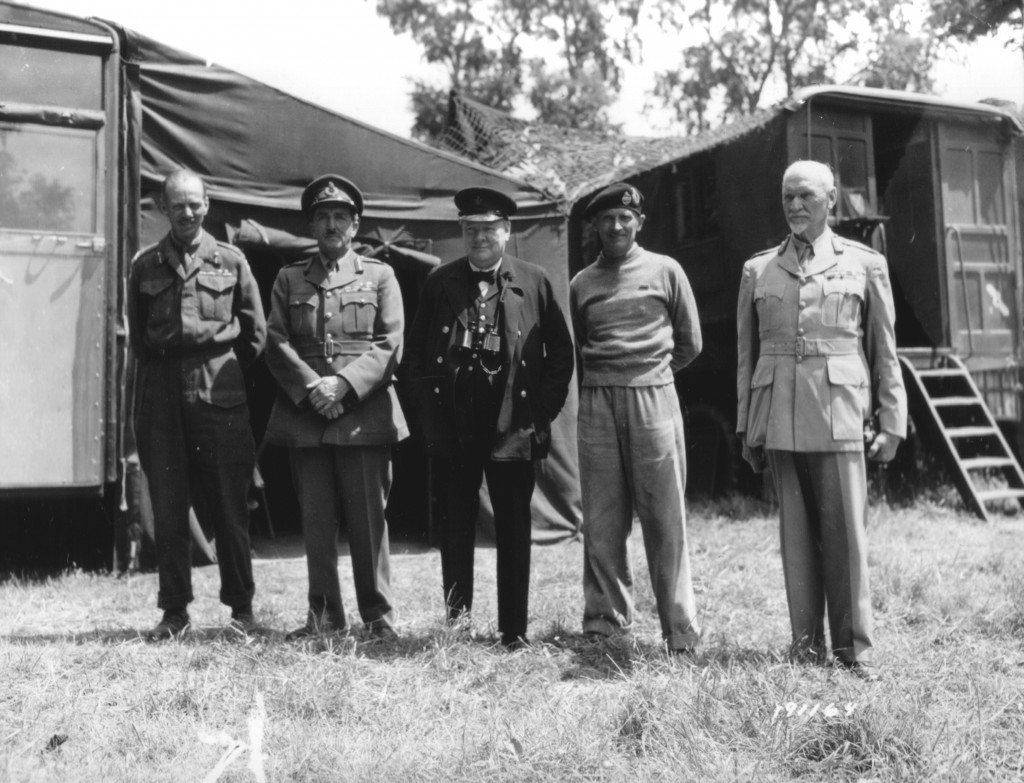Smelling Germans March 20, 2015
Author: Beach Combing | in : Contemporary , trackbackThis is a weird little story that has proved frustratingly difficult to pin down: not even the original reference. 12 June 1944 Churchill, Brook, and Smuts (far right) visited Montgomery’s forward position at Creully to see how the Normandy campaign was unwinding. This much can be attained from several sources not least the photograph above: Montgomery worked out of some caravans in the grounds of Creully. However, two accounts describe a curious event in the grounds at Creully.
As senior officers stood outside with the Prime Minister, South African Field Marshal Smuts sniffed the air and said, ‘There are Germans near us now… I can always tell!’ Two days later two fully armed German paratroopers emerged from the a nearby rhododendron bush, where they had been hiding all along. Had they used their guns and grenades on Churchill, everything would have changed. Nicholas Rankin, Churchill’s Wizards.
A similar account from an earlier book by Alasdair Horne, The Lonely Leader: Monty.
When that old South African wizard, General Smuts, visited with Churchill four days after Monty’s arrival, he pronounced mysteriously ‘I smell Boche’ and a very frightened sixteen-year old German deserter was led in, having been found, half starved, cowering under a stone bench in the woods –‘within fifty yards’ of Churchill and Smuts, recalled Henderson.
There are a couple of interesting facts here. First, there is the fascinating but entirely predictable way in which a single anecdote has become two different ones in post-war books. Beach would normally follow the less dramatic account but Horne names a source: ‘recalled Henderson’. Beach looked them up on google books and does not have any referencing to hand. Can anyone help: drbeachcombing At yahoo DOT com
Then surely more interesting is the simple strangeness of this incident. Beach is fascinated by the character of Smuts, South Africa’s leader in the Second World War and, after Churchill, himself, the most interesting individual from the English-speaking world in the conflict. But, Jan, how do you smell Germans? One site that has dealt with this issue offers two possibilities: one Smuts believed himself to be psychic; second, Smuts recognized a familiar smell and the ‘miracle’ was quite straightforward and related, as the account suggests to his nose. There are no other accounts of Smuts laying claim to psychic abilities, though his adherence to holism is rather exotic. So perhaps a particular form of German BO, ridiculous as this may seem, had caught Smuts attention? Two terrified lads hiding out in the bushes in the sweating June sun who had enjoyed, previously, a similar diet?
In any case, enjoy the moment. Rankin is wrong when he writes that ‘everything would have changed’. But had some German paratrooper decided to use a weapon he could have taken out Monty, Churchill, Smuts and Brooke! Not a bad bag, though not one that would have altered the course of the war by June 1944.
21 Mar 2015: Chris S writes ‘In another life, I remember reading that tobacco smoke carries a long way. Even on the battlefield where one’s senses are assaulted by cordite, gunpowder, fire, etc. Spent a good hour trying to find the citation to no avail. I propose that Smuts’s keen sense of smell picked up the particular blend of tobacco in German cigarettes, which may have been different than English smokes.’
And JCE ‘Doctor, I can’t speak to the incident at hand, but I have read a few dozen memoirs of both British and American soldiers of WWI and WWII fighting on the Western Front and in the European Theater of Operations, respectively, from the well known to the relatively obscure. I recall a handful of anecdotes, most first-hand, which recount events in which Yanks or Tommies say they definitely smelled Germans before they saw them. Notes of sweat, leather and “moldy tobacco” seem to have been most distinctive in the soldaten. I’ve seen this written about enough that I’m confident the soldiers themselves believed there was a specific German “scent”. All I know is that thick woolen uniforms which were rarely washed, much less replaced, must have been truly powerful, just as I know sweaty leather, which made up most German load-bearing gear, also possesses a marked odor.
Below are some relevant links: the first a WWII forum on the topic of “sweaty Germans”; the remainder are references to books. I note as well that US Marines in both WWII and US soldiers in Vietnam commonly reported what they described as a “fishy” odor of Japanese and Vietnamese, respectively. I recall that North Vietnamese soldiers as well as Viet Cong reported that they could detect an American “smell” also, although at the moment I don’t recall how they described it.
Not really what you asked, but I think we can assume there were Allied soldiers who from time to time did sniff out Germans lurking nearby. Links follow. Cheers.
JCE (1) (2) (3) (4)



